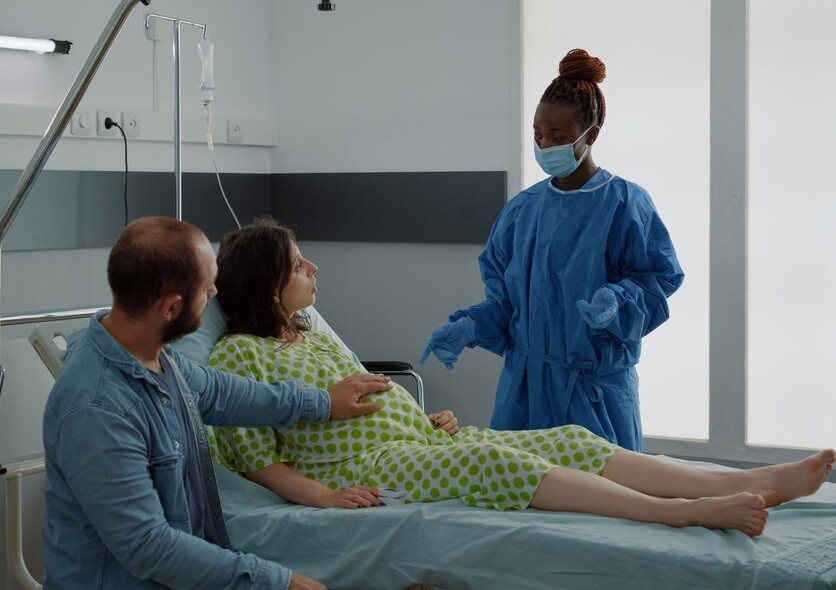Memasuki kehamilan trimester 3, ibu hamil perlu menyiapkan diri untuk menghadapi proses persalinan. Menjelang waktu persalinan, ibu hamil tetap perlu waspada akan risiko komplikasi dan tanda bahaya yang bisa terjadi di masa akhir kehamilan. Apa saja tanda bahaya dan risiko komplikasi yang bisa terjadi di usia kehamilan ini? Berikut penjelasannya.
Risiko Komplikasi Kehamilan di Trimester 3 Kehamilan
Komplikasi kehamilan dapat terjadi di setiap trimester, termasuk di trimester akhir kehamilan. Mengetahui gejala dan risiko komplikasi kehamilan di trimester akhir dapat membantu Anda mencegah dan menangani komplikasi kehamilan dengan lebih baik.
Berikut ini beberapa komplikasi kehamilan yang perlu diwaspadai di trimester ketiga kehamilan:
Diabetes gestasional
Diabetes gestasional adalah tingginya kadar gula darah yang hanya terjadi selama masa kehamilan. Biasanya diabetes gestasional mulai terdeteksi sejak usia kehamilan 24-28 minggu. Kondisi ini terjadi akibat perubahan hormon dan cara tubuh mengolah makanan sehingga menyebabkan tingginya kadar gula dalam darah.
Gejala diabetes gestasional antara lain:
- Sering buang air kecil
- Haus berlebihan
- Kelelahan
- Mual
Jika tidak ditangani dengan tepat, diabetes gestasional dapat memicu komplikasi kehamilan lainnya yaitu preeklampsia dan persalinan caesar.
Baca Juga: Mengapa Penting Melakukan Tes TORCH Dalam Merencanakan Kehamilan?
Preeklampsia
Preeklampsia adalah komplikasi kehamiilan yang ditandai dengan tekanan darah tinggi, tingginya kadar protein dalam urine, atau tanda kerusakan organ lainnya. Gejala preeklampsia dapat muncul pada usia kehamilan 20 minggu atau lebih. Jika preeklampsia tidak ditangani dengan tepat, kondisi ini dapat menyebabkan kematian bagi ibu dan janin.
Ketuban pecah dini
Pecahnya ketuban merupakan bagian normal dari proses persalinan. Namun jika ketuban pecah sebelum waktu persalinan, hal ini bisa menyebabkan komplikasi serius pada janin.
Dalam istilah medis, kondisi ini dikenal dengan istilah ketuban pecah dini atau premature rupture of membranes (PROM). Biasanya ketuban pecah dini terjadi pada usia kehamilan belum memasuki 37 minggu.
Bahaya ketuban pecah dini pada janin antara lain:
- Gangguan pernapasan dan perkembangan paru-paru pada bayi
- Perdarahan pada otak janin
- Lepasnya plasenta dari rahim
- Tali pusar tertekan
Baca Juga: Kenali Tanda-Tanda Awal Kehamilan Ektopik (Kehamilan di Luar Kandungan)
Kelahiran prematur
Kelahiran prematur terjadi ketika ibu hamil mengalami kontraksi teratur sehingga menyebabkan pembukaan serviks setelah minggu ke-20 dan sebelum minggu ke-37 kehamilan. Semakin dini persalinan prematur terjadi, semakin besar risiko kesehatan bagi bayi Anda. Bayi yang lahir prematur akan dirawat di NICU (Neonatal Intensive Care Unit) untuk mendapat perawatan intensif.
Bila pada trimester akhir kehamilan Anda mengalami tanda-tanda seperti perut kontraksi secara teratur, sakit punggung bawah yang terus-menerus dan tumpul, kram perut ringan, perdarahan ringan, dan ketuban pecah sebaiknya segera periksakan ke dokter.
IUGR (intrauterine growth restriction)
IUGR atau intrauterine growth restriction adalah kondisi yang menyebabkan pertumbuhan bayi terhambat. Kondisi ini ditandai dengan ukuran janin lebih kecil dari ukuran ideal. Belum diketahui dengan pasti penyebab IUGR, namun kondisi ini bisa disebabkan oleh banyak faktor, di antaranya:
- Memiliki kelainan plasenta
- Sedang hamil anak kembar
- Pernah memiliki riwayat IUGR pada kehamilan sebelumnya
- Memiliki sel darah merah rendah (anemia), tekanan darah tinggi, atau penyakit jantung
- Memiliki penyakit kronis seperti diabetes, penyakit ginjal, atau penyakit autoimun
Mengenali jenis-jenis komplikasi kehamilan beserta tanda dan penyebabnya dapat membantu ibu hamil menjaga kesehatan lebih baik, terutama di trimester akhir menjelang persalinan. Untuk menjaga kesehatan ibu hamil dan janin, lakukan pemeriksaan kehamilan secara rutin.
Jika memiliki pertanyaan seputar kehamilan, Anda bisa berkonsultasi langsung ke dokter kandungan atau manfaatkan fitur konsultasi pada aplikasi Ai Care yang bisa diunduh melalui App Store dan Play Store.
Mau tahu tips dan trik kesehatan, pertolongan pertama, dan home remedies lainnya? Cek di sini, ya!
- dr Nadia Opmalina
Primary Care. Third-Trimester Pregnancy Complications. Available from: https://www.primarycare.theclinics.com/article/S0095-4543(11)00092-3/abstract
Cleveland Clinic. Preganncy Complications. Available from: https://my.clevelandclinic.org/health/articles/24442-pregnancy-complications
Dulay, A. (2024). Prelabor Rupture of Membranes (PROM). Available from: https://www.msdmanuals.com/home/women-s-health-issues/complications-of-pregnancy/prelabor-rupture-of-membranes-prom
Mayo Clinic. Preeclampsia. Available from: https://www.mayoclinic.org/diseases-conditions/preeclampsia/symptoms-causes/syc-20355745
Mayo Clinic. Gestational Diabetes. Available from: https://www.mayoclinic.org/diseases-conditions/gestational-diabetes/symptoms-causes/syc-20355339
Cleveland Clinic. Intrauterine Growth Restriction. Available from: https://my.clevelandclinic.org/health/diseases/24017-intrauterine-growth-restriction












